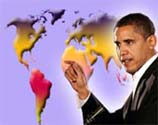Obama fever picks up in Kenya as US election approaches
 Nairobi - US Presidential hopeful Barack Obama's stern face stares out from the back of a rickety Matatu - a commuter minibus - as it swerves through traffic in Kenyan capital Nairobi, the slogan "The Real Change" plastered alongside the image.
Nairobi - US Presidential hopeful Barack Obama's stern face stares out from the back of a rickety Matatu - a commuter minibus - as it swerves through traffic in Kenyan capital Nairobi, the slogan "The Real Change" plastered alongside the image.
By the side of the road a workman digs a trench, his "Obama 08" cap shading his eyes from the sun, while in a nearby bar, patrons chug down Senator beer, a cheap brew that has been nicknamed Obama beer.
In Kenya, Obama's ancestral homeland, it is almost impossible to walk for five minutes without seeing some reminder of the East African nation's fervour for its prodigal son as the US elections swiftly approach on November 4.
The senator's late father was Kenyan, and many of his family, including his grandmother, still live in the tiny village of Kogelo in Western Kenya.
The link may be tenuous given that Obama has far closer links with his mother's side - his father abandoned the family when Obama was only two years old - and has only visited Kenya a handful of times.
However, cheering crowds mobbed Obama's route during his last visit in 2006 and a recent BBC poll found that support for the senator in Kenya stood at over 80 per cent.
Perhaps the most high-profile show of support came earlier this month when conservative US author Jerome Corsi, who had hoped to launch his book attacking the senator in Nairobi, was very publicly deported for visa violations.
However, Kenya's tribal divisions, which exploded spectacularly into bloodshed early this year after disputed presidential elections, also show up when it comes to Obama.
Many of the main protagonists in the violence that saw over 1,100 killed were Kikuyu, the tribe of President Mwai Kibaki, and Luo, the tribe of then opposition leader Raila Odinga, who accused Kibaki of stealing the election.
Odinga became Prime Minister in a deal that brought the violence to an end and the coalition cabinet has held together, but the tribal divisions have not gone away.
Obama's father was Luo, and as a result support for Obama among the Kikuyu, the largest of Kenya's forty-plus tribes, is decidedly thin.
Nonetheless, many believe that having a US President with Kenyan links can only be good for the country, although there is realism over how much he can do for his father's native land given the current problems facing the US economy.
"It will be good for Kenya, although maybe just through a few more scholarships for Kenyans and some more American tourists," says bus driver James Kinywa, 41.
The general opinion among ordinary people in the former British colony is that having Obama in the White House may not bring more aid and investment but that it will have other, less tangible benefits.
"It will be good for black people in general," says Daniel Ruto, 28, a gym instructor. "Whites will take us more seriously and it will gives us more self-confidence."
Others believe that having a young black man leading one of the world's most powerful nations will send a message out to African leaders, such as Zimbabwe's Robert Mugabe, who are desperately clinging onto power in their twilight years.
"It will be a new world order if Obama wins," says doctor Philip Gitu, 51. "There will be no more room for old leaders in Africa."
With Kenyan newspapers cheerfully highlighting Obama's healthy lead in the polls, you would perhaps expect there to be high levels of optimism about the senator's chances of victory.
However, there seems to be a certain amount of pessimism amongst a cross-section of Kenyans, with many believing that white voters simply will not vote for a black man.
"I don't think he will win," says Mary Isaji, a market trader. "White people in the US are racist."
Pessimistic or not, most of Kenya will be glued to their TV sets come November 4 and many a glass of "Obama" beer will be raised should Kenya's favourite son secure the predicted victory. (dpa)